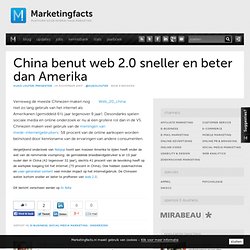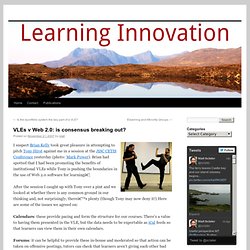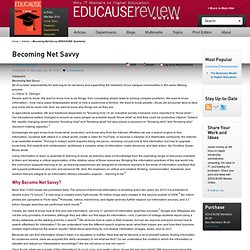

Videoblog. Limburg. China benut web 2.0 sneller en beter dan Amerika. Hugo Louter, Presenter 14 november 2007 @hugolouter 6026 x bekeken Verreweg de meeste Chinezen maken nog niet zo lang gebruik van het internet als Amerikanen (gemiddeld 6½ jaar tegenover 9 jaar).

Desondanks spelen sociale media en online onderzoek er nu al een grotere rol dan in de VS. Chinezen maken veel gebruik van de meningen van mede-internetgebruikers: 58 procent van de online aankopen worden beïnvloed door kennisname van de ervaringen van andere consumenten. Vergelijkend onderzoek van Netpop toont aan hoezeer Amerika te lijden heeft onder de wet van de remmende voorsprong: de gemiddelde breedbandgebruiker is er 10 jaar ouder dan in China (42 tegenover 32 jaar), slechts 41 procent van de bevolking heeft op de werkplek toegang tot het internet (75 procent in China). Ook hebben zoekmachines en user-generated content veel minder impact op het internetgebruik. Dit bericht verscheen eerder op In feite Gepost in: E-business, Social media marketing , Onderzoek Over de auteur. Zoho - Online Office tools and more.
VLEs v Web 2.0: is consensus breaking out? - Virtual Learning. I suspect Brian Kelly took great pleasure in attempting to pitch Tony Hirst against me in a session at the JISC CETIS Conference yesterday (photo: Mark Power).

Brian had spotted that I had been promoting the benefits of institutional VLEs while Tony is pushing the boundaries in the use of Web 2.0 software for learning… After the session I caught up with Tony over a pint and we looked at whether there is any common ground in our thinking and, not surprisingly, there’s plenty (though Tony may now deny it!) Here are some of the issues we agreed on: Calendars: these provide pacing and form the structure for our courses. There’s a value to having them presented in the VLE, but the data needs to be exportable as iCal feeds so that learners can view them in their own calendars. Forums: it can be helpful to provide these in-house and moderated so that action can be taken on offensive postings, tutors can check that learners aren’t giving each other bad advice etc.
Kwalificaties MBO. Tim Sodhi's Rails LD Editor. Home. Twitter. Becoming Net Savvy (EDUCAUSE Quarterly) Viewpoint Becoming Net Savvy All of us bear responsibility for learning to be net savvy and supporting the members of our campus communities in the same lifelong process By Diana G.

Oblinger People want to know. In agricultural societies, life and livelihood depended on "knowing how. " Increasingly we gain know-how, know-what, know-who, and know-why from the Internet. Using information to learn is essential to learning to know, as learners seek out knowledge from the exploding range of resources available to them and develop a critical appreciation of the relative value of those resources. Why Become Net Savvy? More than 3,000 books are published daily. Because we can find information doesn't mean it is reputable or truthful. Once found, what use is made of the information? Learning to Be Net Savvy Libraries are not the only organizations with responsibility for ensuring our students—or the rest of us—can find and use information. Much more is at stake, however, than information.
Endnotes 1.